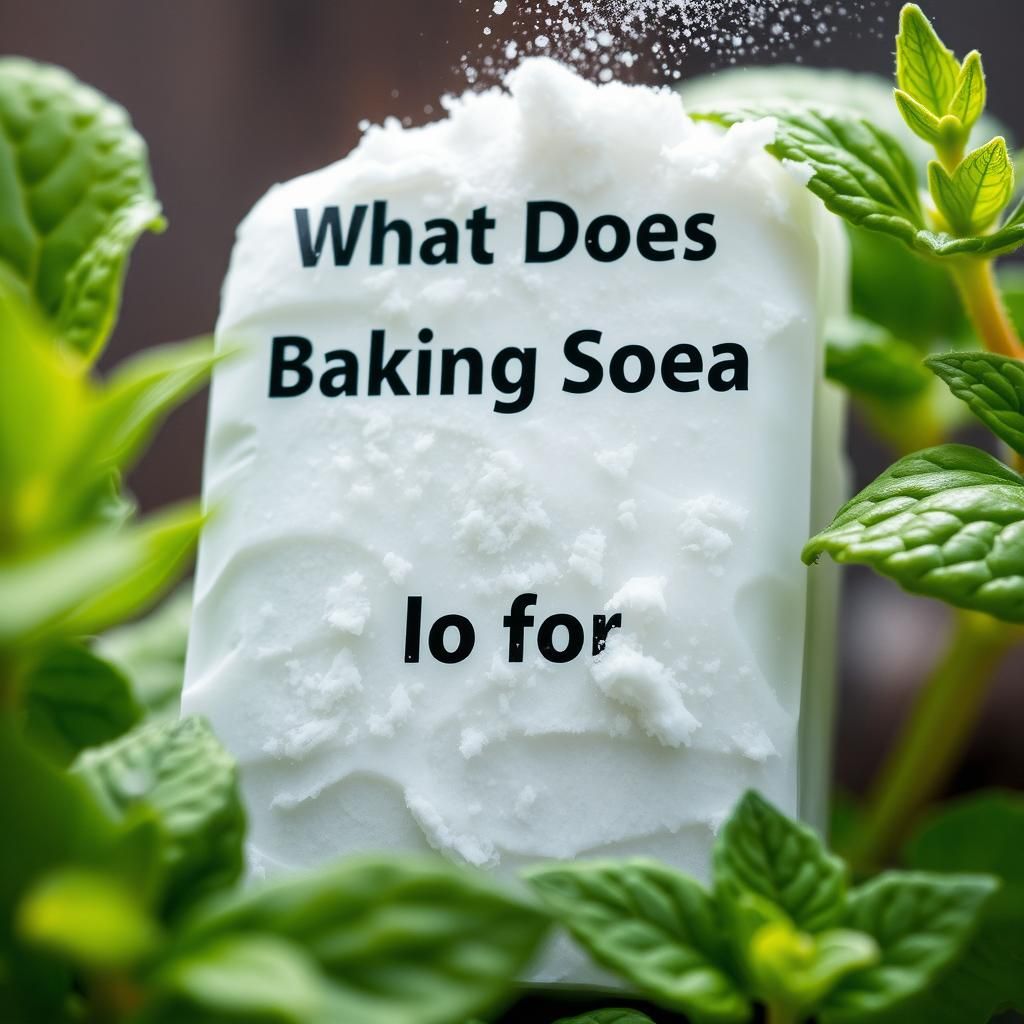What Does Baking Soda Do for Plants? Discover Its Benefits and Uses in Gardening

Baking soda, a common household staple, offers surprising benefits for gardening enthusiasts. Beyond its culinary uses, this versatile ingredient can enhance plant health, improve soil quality, and deter pests. By understanding the role of baking soda in gardening, you can unlock its potential to support your plants’ growth and vitality. Whether you're looking to adjust soil pH, prevent fungal diseases, or promote blooming, baking soda can be a valuable addition to your gardening toolkit. This article delves into the various ways baking soda can be utilized in your garden, highlighting its effectiveness and practical applications for both novice and experienced gardeners alike.
How Baking Soda Benefits Plants
Baking soda, or sodium bicarbonate, is a versatile compound that can provide several benefits for plants, particularly in gardening and agriculture. One of its primary roles is to act as a natural fungicide, helping to combat fungal diseases like powdery mildew and black spot by creating an alkaline environment that discourages fungal growth. Additionally, baking soda can help to balance the pH levels in the soil, promoting better nutrient absorption for plants. It also serves as a mild abrasive that can help to remove pests when mixed with water and sprayed on the foliage. Moreover, its low toxicity makes it a safe option for organic gardening practices, making it ideal for households with pets and children. Overall, the use of baking soda for plants is a natural and economical way to enhance plant health and yields.
Fungal Disease Treatment
Baking soda is widely recognized as an effective treatment for various fungal diseases that affect plants. When mixed with water and applied as a foliar spray, it creates an alkaline environment on the leaf surface that inhibits the growth of pathogens such as powdery mildew. This treatment can be used preventively or after noticing symptoms, and it is particularly beneficial for gardeners looking for a non-toxic alternative to chemical fungicides.
pH Balancing in Soil
The pH level of the soil can significantly impact plant health and nutrient absorption. Baking soda can be utilized to raise the pH of overly acidic soils, making it more alkaline. By sprinkling baking soda around the base of plants or mixing it into the soil, gardeners can help ensure that plants take up essential nutrients like nitrogen, phosphorus, and potassium more efficiently, leading to healthier growth.
Natural Pest Control
In addition to fighting fungal infections, baking soda can also serve as a natural remedy for pest control. When mixed with water and a few drops of dish soap, it can be sprayed on plants to help remove pests like aphids and spider mites. The abrasive nature of baking soda helps to suffocate these small pests without the use of harmful chemicals, making it a safe choice for those practicing organic gardening.
Improving Seed Germination
Research indicates that soaking seeds in a baking soda solution before planting can enhance germination rates. The alkaline properties of baking soda may help to break down seed coats, allowing moisture to penetrate more effectively. This simple process can lead to quicker and more uniform sprouting, improving the overall yield of plants.
See also:
Enhancing Flavor and Quality of Produce
Using baking soda in the garden not only promotes plant health but can also enhance the flavor and quality of produce. By regulating soil pH and improving nutrient uptake, plants can produce tastier fruits and vegetables. Additionally, applying a baking soda solution can help reduce the bitterness in certain crops, resulting in a sweeter and more palatable harvest.
| Benefit | Description |
|---|---|
| Fungal Disease Treatment | Acts as a natural fungicide to combat diseases like powdery mildew. |
| pH Balancing | Helps raise the pH level in acidic soils for improved nutrient absorption. |
| Pest Control | A natural remedy to help remove pests without harmful chemicals. |
| Seed Germination | Can improve germination rates by breaking down seed coats. |
| Flavor Enhancement | Improves the taste and quality of fruits and vegetables. |
Can I put baking soda directly on soil?
:strip_icc()/Adding-Baking-Soda-to-Plants-in-Garden-1419286443-716191087dea4050a691a55157a69e2b.jpg)
Yes, you can put baking soda directly on soil, but there are several factors to consider before doing so. Baking soda, or sodium bicarbonate, can affect soil pH and has some practical applications in gardening. However, excessive use can lead to detrimental effects on plant health and soil quality.
Effects of Baking Soda on Soil pH
Baking soda can increase the soil’s pH, making it more alkaline. This adjustment can benefit certain plants that thrive in alkaline conditions. However, it is essential to be cautious about how much is applied, as overuse can lead to soil imbalance.
- Understand the optimal pH range for the plants you are growing.
- Test the soil before application to assess current pH levels.
- Apply baking soda gradually to avoid sudden changes in soil chemistry.
Using Baking Soda as a Pest Control
Baking soda has been noted for its potential to control certain pests. It can act as a mild fungicide and insecticide, helping to protect plants from common garden threats.
- Mix baking soda with water to create a spray solution for pest control.
- Target problematic areas rather than applying it directly to the soil.
- Monitor plants after application to see how they respond to the treatment.
Application Methods for Baking Soda
When applying baking soda to the soil, consider the method to ensure even distribution and effectiveness.
See also:
- Sift baking soda as a top dressing around plants to minimize direct contact with roots.
- Dissolve in water for a liquid application, which can help penetrate the soil more effectively.
- Incorporate into compost before adding it to the soil for balanced effects.
Potential Risks of Using Baking Soda
While there are benefits to using baking soda in the garden, there are potential risks involved that need to be weighed.
- Excessive application can lead to sodium build-up, which is harmful to plants.
- May disrupt beneficial microorganisms in the soil.
- Monitor plant health for signs of stress after application.
Alternatives to Baking Soda in Soil Management
If you are concerned about the impacts of baking soda, there are various alternatives for managing soil health and pest issues.
- Use organic fertilizers that provide a balanced nutrient profile without altering pH.
- Employ natural pest deterrents like neem oil or insecticidal soap for plant protection.
- Consider composting as a long-term solution to enrich soil without the risks associated with baking soda.
Questions from Our Readers
What benefits does baking soda provide to plants?
Baking soda offers several benefits to plants, primarily due to its sodium bicarbonate composition. It helps to neutralize soil acidity, thereby creating a more balanced environment for plant growth. Additionally, it can act as a fungicide, reducing the incidence of fungal diseases such as powdery mildew.
Can baking soda help with pest control in plants?
Yes, baking soda can aid in pest control when applied in certain concentrations. It creates an unfavorable environment for pests due to its alkaline nature, which can deter insects and prevent infestations. However, it’s important to apply it carefully to ensure it does not harm beneficial insects.
How should baking soda be applied to plants?
Baking soda can be applied by mixing it with water to create a spray solution. For best results, a common ratio is one tablespoon of baking soda per gallon of water. This mixture can be sprayed directly onto plant leaves to tackle fungal issues or even the soil to modify its pH levels.
Is there any risk in using baking soda on plants?
While baking soda is generally safe, there are some risks involved if used excessively. Overapplication can lead to raised levels of sodium in the soil, which may become toxic to plants and affect their overall health. Therefore, it’s crucial to use it sparingly and monitor the condition of your plants.
See also:

If you want to read more articles like What Does Baking Soda Do for Plants? Discover Its Benefits and Uses in Gardening, we recommend you check out our Plants category.
Leave a Reply
Related Articles